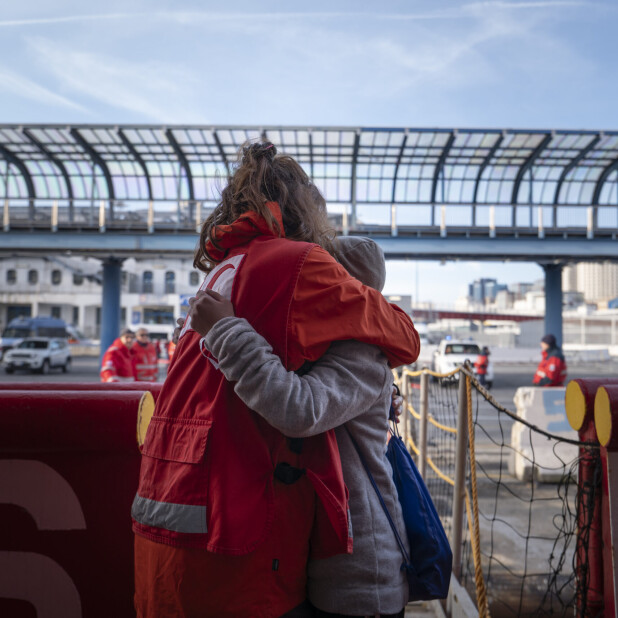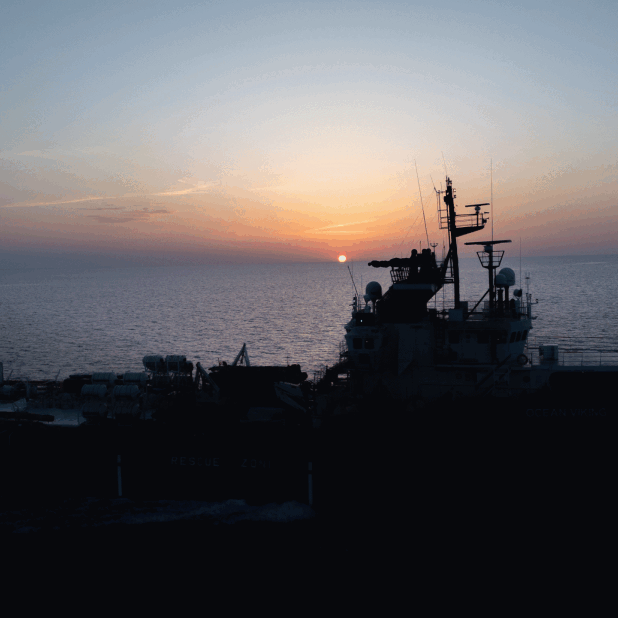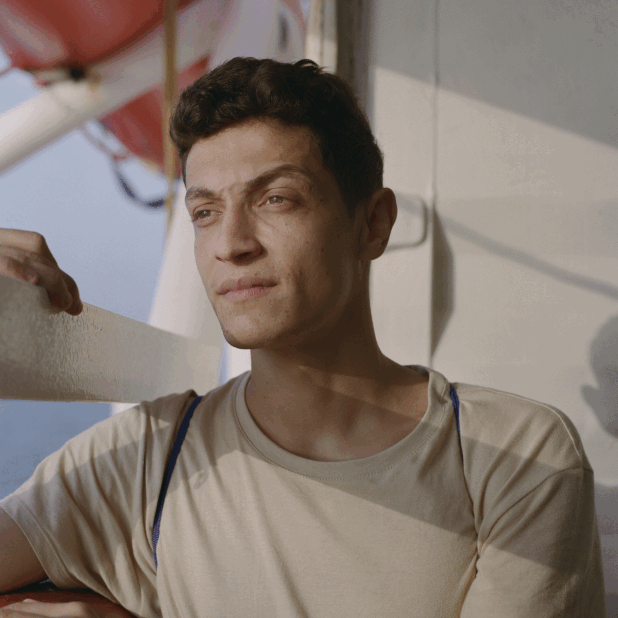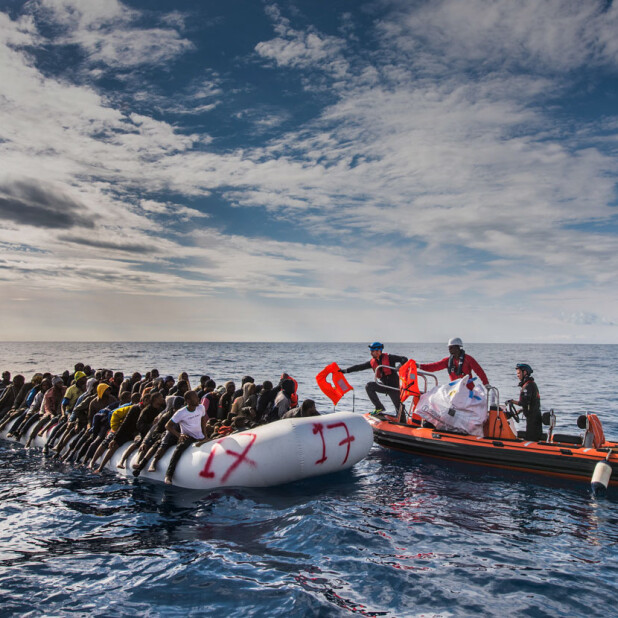
Welcome to “A Country in Focus“, our new series of reports. Since 2016, SOS MEDITERRANEE has rescued 41,383 people from nearly 50 countries. These reports offer an insight into the reasons why men, women and children had to flee their homes and help you better understand the hardships they endured along the migration route before being rescued by the Ocean Viking.In 2024, the Ocean Viking rescued 1,948 people, a third of whom were from Syria. Some were children and women travelling alone, while others were families and elderly people. We collected many testimonies from Syrians who told us about the war, violence and hunger in their country, and the dangerous routes they had been forced to take to survive. Some of their journeys had taken months or even years. In the days on board following their rescues, Hamza*1, Ranim*, Mouna*, Khaled*, Hussein, Mohammad and Majd shared their stories with us.
What did they experience in Syria? Why did they have to flee their homes to Lebanon, Iraq, Egypt or Libya? How did they face torture and violence again before being forced to take to the sea and leave their homes even further behind? “A Country in Focus: Syria” reveals the answers.
While we were finalising this report, Bashar al-Assad’s regime collapsed after 24 years in power. On 8 December 2024, following the capture of the Syrian capital Damascus by the Hayat Tahrir al-Sham (HTS) group, the former president fled to Russia. Since then, the HTS has installed a transitional government to run the country, led by the interim prime minister, Mohammed al-Bashir.
Following the fall of the regime, many Syrians have begun to return home, with high hopes despite an uncertain future.
Meanwhile, several European nations have suspended asylum requests for Syrians, both for those already trying to build a new life in their host country, and for those currently risking their lives attempting to cross the Mediterranean Sea.The testimonies and expert insights shared in this report were gathered before the fall of Bashar al-Assad’s regime. The survivors’ stories reveal the difficult choices they made that led them to cross the Mediterranean, the violence they endured and the hope that kept them going.
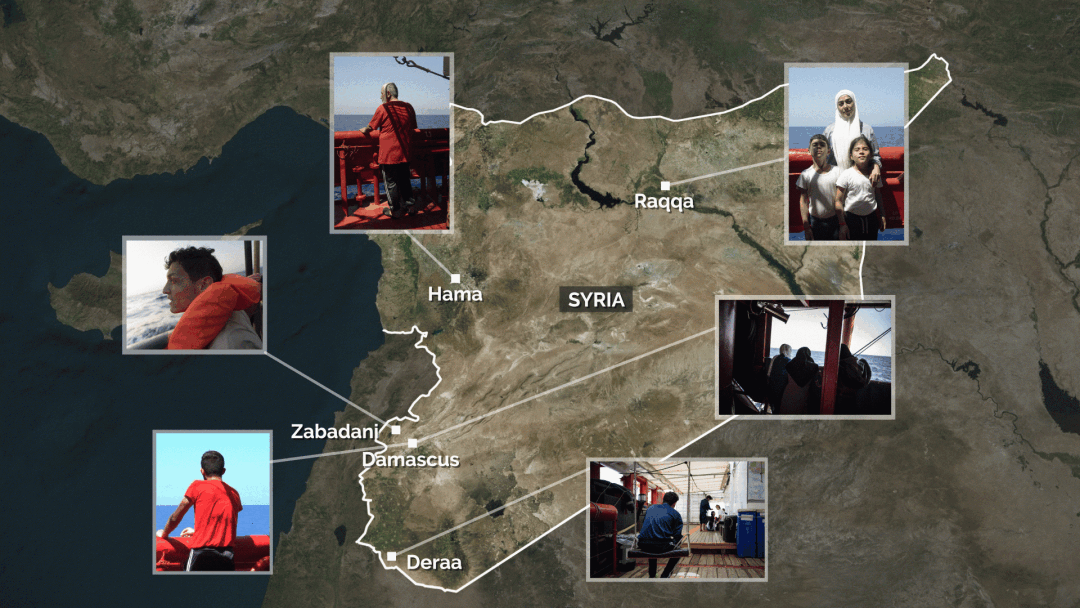
The expert's analysis
In an interview with SOS MEDITERRANEE in October 2024, Marta Bellingreri, an Arabic-speaking freelance journalist and the editor of SyriaUntold*2, said, “In the past thirteen years, Syria has been split by one of the most heinous conflicts of our time. It started with a peaceful revolution demanding rights, freedom and dignity, which was violently repressed by the ruling family – the [then-]current government of Bashar al-Assad – and its security apparatus. In the few years following the protests and the civic movements, the conflict erupted violently, with interventions by foreign countries like Turkey and Qatar, while Iran and Hezbollah supported the regime. Half of the pre-war Syrian population has left their homes. Five million are refugees abroad, with many residing in neighbouring countries such as Turkey, Lebanon and Jordan. The Syrian people have continued to suffer both within and outside the country: in the past four years, a major economic crisis, coupled with a climate and agricultural crisis, has increased poverty. Ninety per cent of the population now need humanitarian assistance, especially those who have been internally displaced. Outside Syria, notably in Lebanon and Turkey, Syrian refugees are also facing dire conditions and increasing discrimination, in particular following Israel’s recent invasion of Lebanon.”
In January 2025, following the latest events in Syria, Marta Bellingreri added, “On 8 December 2024, after 10 days of military operations led by opposition armed groups, the Syrian dictator Bashar al-Assad fled the country, ending 54 years of his family’s rule. Millions of Syrians inside and outside the country celebrated as one of the revolution’s main demands became reality. Despite the many challenges they now face, a fragile hope for a better future is driving this transitional phase. Less than 24 hours after the regime fell, some European countries decided to freeze asylum applications, bringing more uncertainty to Syrian people Heading towards Europe. Meanwhile, many Syrian refugees who would like to visit their country now the regime has fallen are unable to travel unless they hold a foreign passport.”
In their own words: why people had to flee their homes
Hamza*, 30, was born in Rif Dimashq Governorate. He was rescued on 17 July 2024.
“I want to tell you what it was like when the war in Syria started.
“I know the story of a little boy who sprayed a message against Bashar al-Assad on the wall of his school in 2010. The school reported him to the secret services, and they came to take him away. The family demanded to see their child, and they were given back his body. He had torture marks, and his genitals had been tied together so he couldn’t pee. When people heard about this, they started to riot, and the riots spread through the towns. The police took young people who were involved and beat and crucified them to stop the riots. Anyone who took part was shot at. They broke into families’ homes and raped the women in front of their family members, if they could find them. If you resisted, they would take your family and burn your house down. But all this only fuelled the riots.”
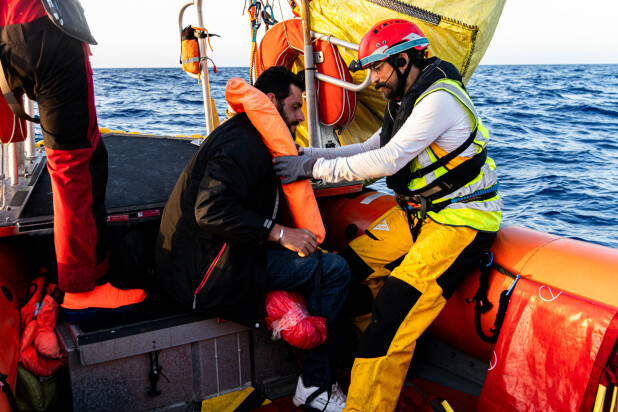
The rioters weren’t organised, and nor was the government. There was a lot of killing all over the country. The government asked Hezbollah for help to contain the violence, and gave more weapons to civilians to provoke conflict among them instead of against the government. They falsely accused families, and they also knew what time families were at home during Ramadan. They used that time to enter their homes and kill them. When people tried to hide or flee, the houses were bombed and the people shot. Hunger was also used as a weapon. A kilo of rice cost as much as a car. One of my cousins was killed when he went to buy rice, just like that. Both the government and the rebel groups pressured my father and me to join them. But we didn’t want to fight.
“In 2012, my family decided to flee to Lebanon. At the same time, my brother, who was in the army, deserted. He was forced to go to his own village to kill people. But he refused to do it. They bombed his hometown, so he had to flee. He paid his superior officer $3,000 to give him 24 hours before informing the authorities of his desertion.”
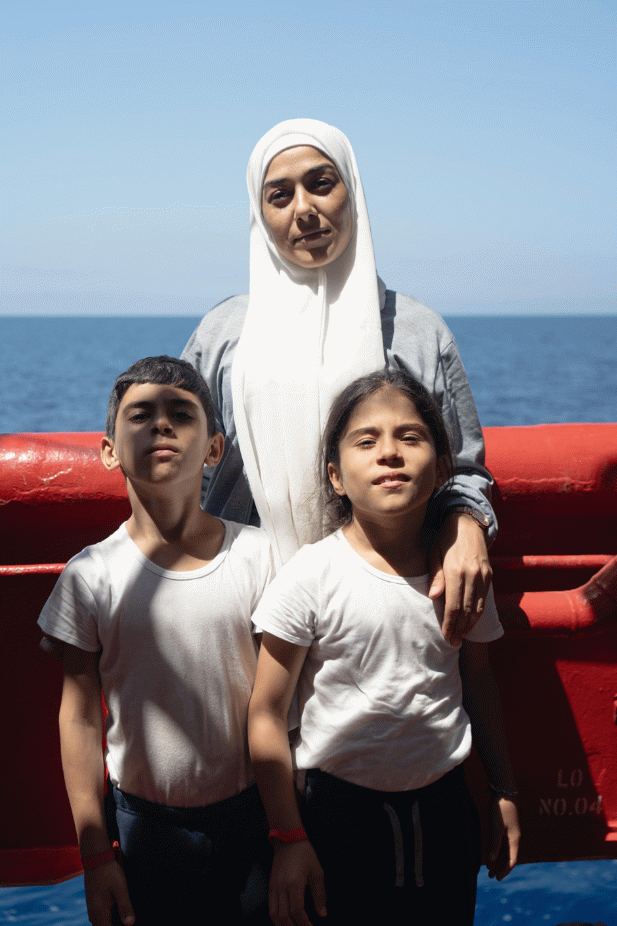
Ranim*, 27, is from Raqqa. She was rescued from an overcrowded wooden boat with her two 8-year-old twins on 9 July 2024.
Ranim* and her children lived under Islamic State rule for three years between 2014 and 2017. “It was a reign of terror. I couldn’t leave the house without being completely covered, including my eyes. If I left the house without my burqa, my husband would be punished and put in prison. It was impossible to escape – it was too dangerous.”
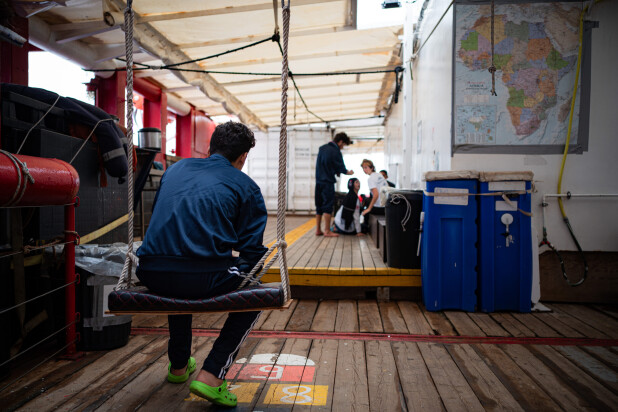
Khaled*, 15, is from Deraa. He was travelling alone and was rescued by the crew of the Ocean Viking on 24 October 2023.
“I’m from Deraa in Syria. I was born in 2008. After the war started in Syria, my parents, my two sisters and I moved to Germany, where I stayed from 2013 to 2016. My parents thought the situation would be better in Syria after a few years, so we went back.
“But we can’t live in Deraa. My country is in a very bad situation because of the war, and so many people are killed there every day. There’s no future for me there. That’s why I decided to leave Syria, even though my parents tried to stop me. In the end, they agreed, and I left with my cousin. I went through Egypt to Libya.”
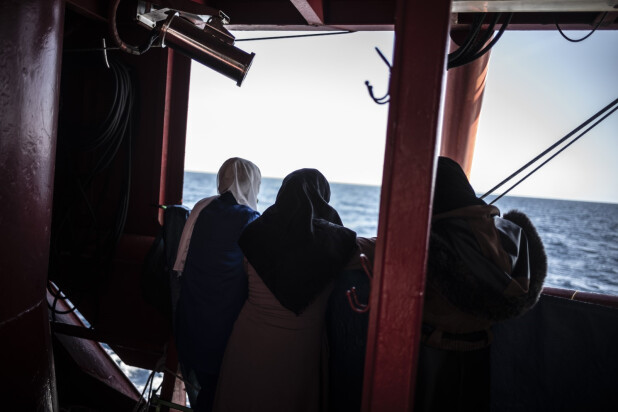
Mouna* is 53 years old and was born in Damascus. She was rescued from a small wooden boat in distress by the Ocean Viking’s crew on 31 July 2021.
“I didn’t want to leave Damascus. Two of my sons left Syria and fled to Libya because of the war. In 2014, someone took a picture of my 17-year-old daughter at a peaceful demonstration. They wanted to arrest her. I can’t tell you how important my daughter is to me.
“My husband stayed in Syria. One day a rocket hit our house in Damascus. Luckily, they were warned in time, and my husband wasn’t inside. After the rocket attack, we decided that my husband should also come to Libya.”
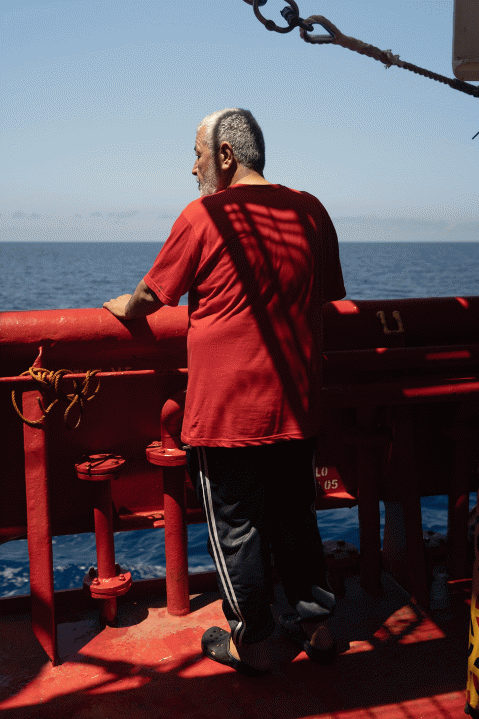
Hussein*, 56, is from Hama. He was rescued on 9 July 2024.
“In my country we have suffered two wars. The first is the one you all know and have heard about. But I don’t want to talk about the first war. It’s too painful to remember. That war is now over in my town. Today we are fighting another war: hunger. It’s like a fire that burns everything and everyone.”
In Syria, Hussein* studied and worked for years as a nurse, as did his wife, a cardiac surgery nurse who stayed in Syria. “Today, a nurse’s salary is $15 a month.” His two oldest children are doctors. “They also stayed in Syria, unemployed, because it’s simply impossible to find a job.”
A few years ago, Hussein* decided to try his luck and open a language school in his town, attempting to support his family and pay for his younger children’s university education. But it didn’t work out. “Nobody could afford to pay for the language courses, and I couldn’t pay the teachers’ salaries or the rent for the school.” He had to close down. So he decided to leave: “Nobody in my town – at least nobody I know – had ever tried this journey. I didn’t know how terribly dangerous it could be, but I was desperate, so I did it.”
The migration route and the host countries: the example of Lebanon
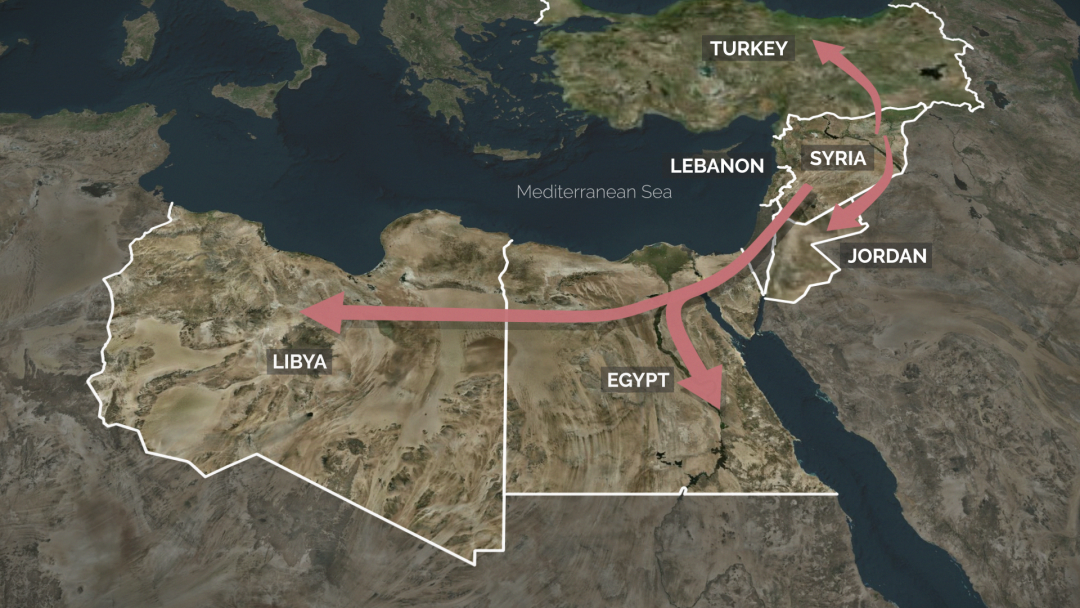
As Marta Bellingreri has explained, many Syrians first flew to neighbouring countries such as Lebanon, Iraq, Egypt, Turkey and Jordan. Most of the survivors rescued in 2024 told the SOS MEDITERRANEE team that they stayed in Lebanon for months or years until the situation deteriorated, leaving them no choice but to flee further away once again.
Hamza*: “When people flee from Syria to Lebanon, they’re checked at the border and often humiliated. We’ve been in Lebanon for 10 years. But the situation is difficult. There’s a lot of segregation between Lebanese and Syrians. Sometimes they make people dig graves in a cemetery and bury them alive. Not to kill them, just to scare them. Without a good relationship with the local people, you have no chance. I was in Lebanon with my family. I have a wife and two kids – a son and a daughter.
“People told us that if we were suffering, we should go to the UN. But when we did, we found that the local UN staff were Lebanese and they also believed in segregation. They didn’t want to help us because we were from Syria. Several groups threatened us and we couldn’t live a normal life. Often, I couldn’t pay for my medicine. On several occasions, I wasn’t paid my salary at the end of the month. If I had been paid for my work, I would have stayed in Lebanon.
“My family fled to Iraq in 2022 because we could no longer live in Lebanon. We borrowed money from someone to escape. Things are very different in Iraq, better than in Lebanon. But I didn’t earn enough money to survive. My wife and children are still in Iraq, but a friend paid for me to escape to Europe.”
Ranim* divorced her husband after the liberation of Raqqa and flew to Beirut. “Being on my own in Syria with my two children was difficult. My parents were already in Beirut, so I decided to join them. I spent five years in Lebanon.” She left Lebanon with her twins in early 2024 after being denied family reunification with her brother in the Netherlands. “My little brother is settled in the Netherlands, and we asked for family reunification. My parents and I got the authorisation to reunite with my brother, but surprisingly, my children didn’t. I couldn’t leave them, nor could I stay alone in Lebanon without my family’s support. I had no choice but to make a dangerous journey and fly to Benghazi in Libya.”
From violence to violence: instability in the Middle East and the journey to Libya
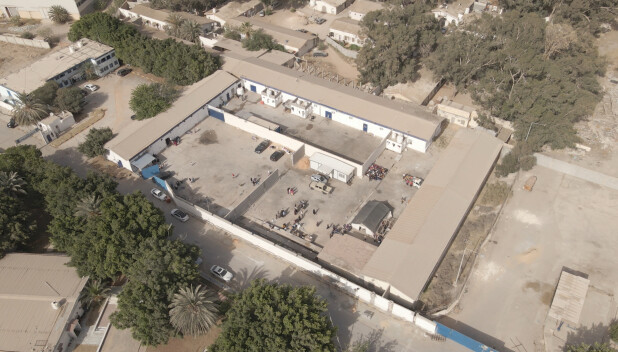
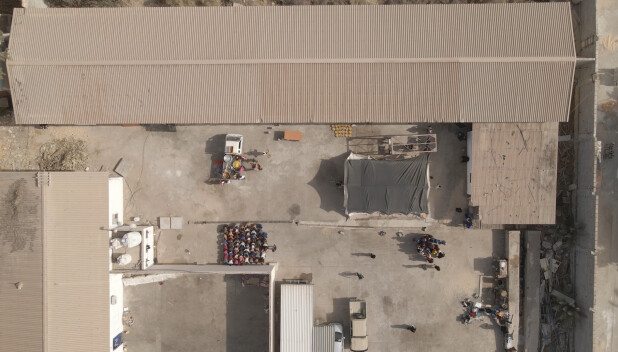
Over the years, SOS MEDITERRANEE has collected many testimonies, corroborated by reports by multiple INGOs and UN agencies*3, revealing that human rights violations and abuses are still a widespread reality in the central Mediterranean and along the migration route, especially in Libya. Imprisonment in inhumane conditions, extortion under torture, summary executions, forced labour and sexual violence occur in detention centres and labour camps, at checkpoints and even in private homes. Such abuses can happen to anyone – women and girls, men and boys. Violence is often used by militias, the police, smugglers and coastguards to extort money. survivors frequently experience repeated abuse by multiple perpetrators, with little chance of justice.
Hamza*: “I went to Tripoli. One day, I was standing with one foot on the pavement and the other on the road. A car swerved and hit me. It didn’t stop, and I’m sure it did it on purpose. The hospital was very close, but when I got there, they refused to help me. So, I went to another place where they did. Afterwards, a smuggler approached me while I was drinking in a cafe on the street. He said he could help me for the price of $6,000. The man took me to a house with containers in the back. I spent a month there. We had very little food or water and he took our phones.”
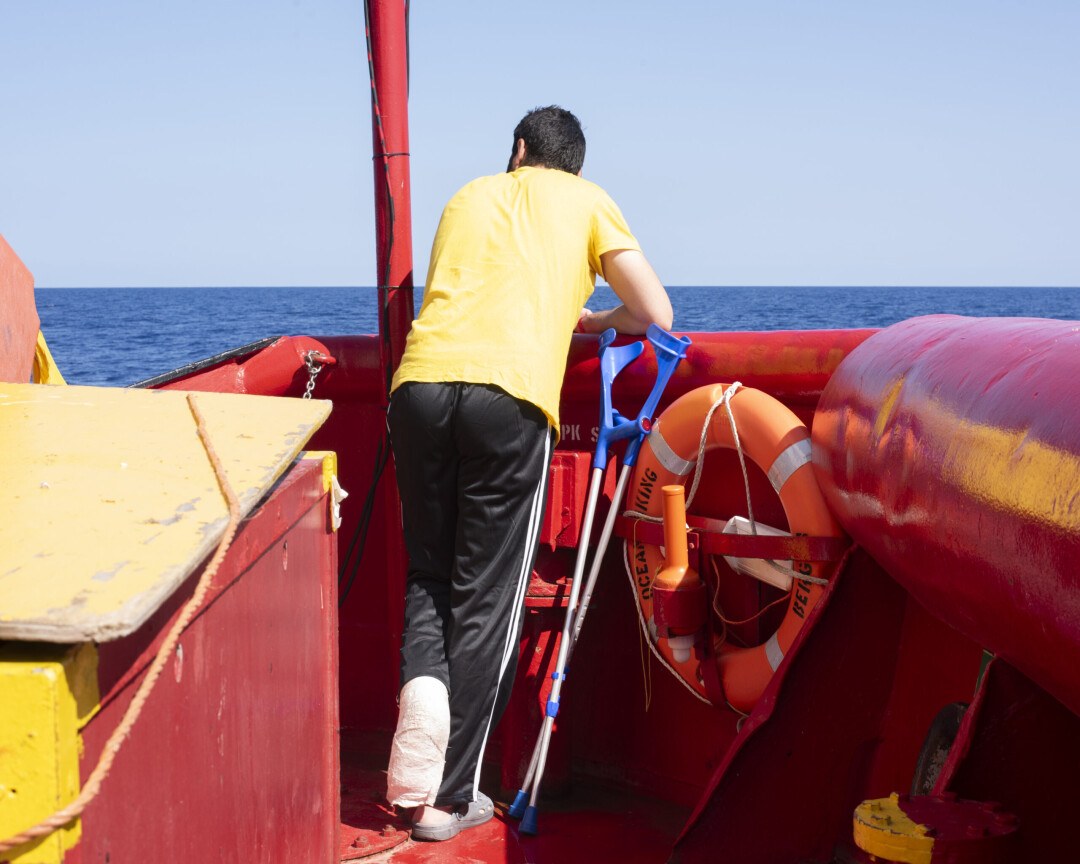
Mouna*: “We all stayed in Libya. My daughter married a Syrian there. One day, while my son-in-law was working, he was attacked by men who were armed like militia. They shot him in the back.
“Soon after, my husband and my younger son were kidnapped. The kidnappers demanded a ransom. They brought my son and husband back to us, but you should have seen the state they were in. They were covered in blood. We got scared and went to Tripoli, hiding in the heart of the capital.
“There’s no medicine in Libya – there’s no healthcare. We spent all our money trying to get my son-in -law medical care and they just let him die. We pleaded with UN agencies, we told them everything and we tried to get him treatment in Egypt or Tunisia, but they said, ‘no, stay in Libya’.
“If I go back to Syria, I’ll be arrested at the airport because my sons are running away from military service. They would arrest me to pressure my children to come back.”
Ranim* and her twins spent three months in Libya. They were placed in a “connection house” in appalling conditions. “I only had one meal a day.” The three had to wait for some time before being put on a boat to leave Libya.
Hussein* left his country at the beginning of May to go to Lebanon and then on to Europe, passing first through Egypt and flying from there to Benghazi, Libya. After the smugglers took him to Benghazi, he was driven 1400 km to Tripoli in the back of a pickup truck with five other people, hidden under heavy luggage in the burning sun.
He was detained for 60 days in a compound in Tripoli with around 80 other people: “I had to lie on a dirty mattress on the floor and the only thing I ate every day was tuna. […] The smugglers didn’t use violence against me, but I witnessed it. I remember one day they came and literally walked on the people sleeping on the ground, as if they were chickpeas.”
He couldn’t go out: “In Libya, Syrians are a Target – the criminals and smugglers consider us richer than people from other countries, so they kidnap us and demand ransom money from our families because they know they will pay. Over there, people aren’t seen as people. They are money – they are business.”
The last resort for survival: taking to the sea
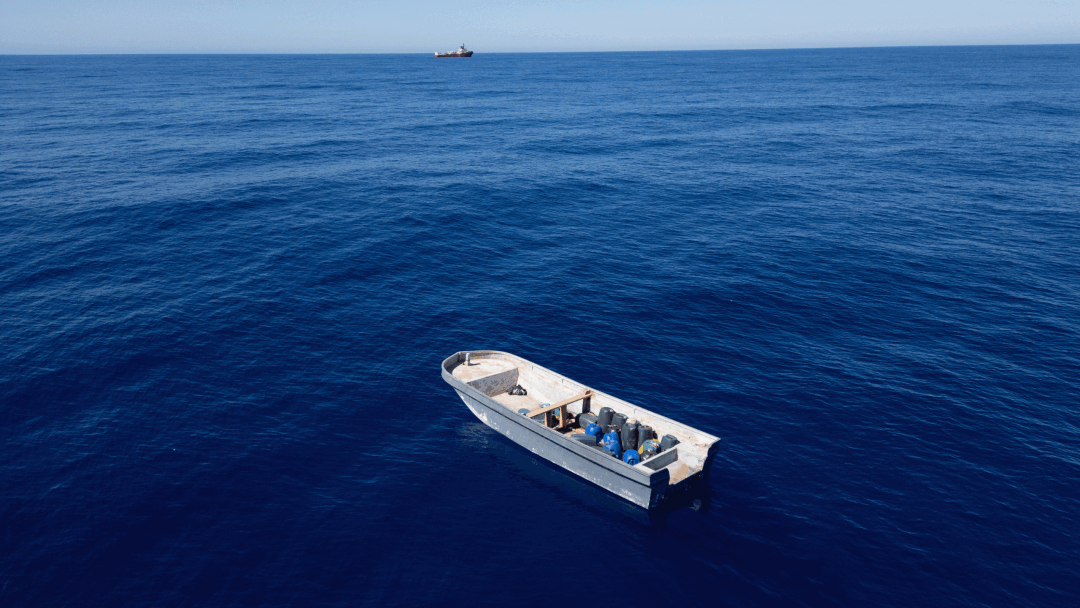
We hear one sentence over and over again on board the Ocean Viking: “I’d rather die quickly at sea than slowly in Libya. ” No matter the dangers, people flee by sea because it’s the only way out. Mouna*, Hamza*, Ranim* and Khaled* tell us about their experience.
Hamza*: “Many Syrians get on boats that are in very bad shape, with bad engines. After 20 km the boat sinks and the people are left to die.”
Khaled*: “I tried to escape from Libya seven times before you rescued us on the Ocean Viking. The first time was on a fishing boat from the eastern part of Libya after crossing the border from Egypt, but the Libyan coastguard pushed us back and we were sent back to prison because the militias and traffickers are friends with the authorities.
“The second time I tried to escape Libya was from Tobruk in June 2023. I wanted to go on a big fishing boat which had 900 people waiting to board. I couldn’t get on because there were too many people and there was no room, but my friend could. The ship left… you know, this is the ship that sank off Greece [the Adriana]. My friend died in that shipwreck.”
Ranim*: “There are a lot of Libyan police at sea now. When we were taken across, we didn’t have life jackets. I knew that the crossing was dangerous. But I had no choice. I was scared, but I had to be strong for my children. I want to be with my parents, and I want my children to have a decent future.”
Mouna*: “My children in Libya have small children. They shouldn’t cross the sea. But I’m sick, and if I don’t go, I’ll die anyway. So I decided to go. I gave the smuggler $2,500 for my first attempt, but the Libyan coastguard stopped us. Then they put me in prison. Words can’t describe what it was like. They wanted $200 to let me out. That prison…
“I said to myself, ‘I’ve had enough, I’m going back to sea.’ The smugglers had promised us two engines, a satellite phone, GPS and life jackets. There was nothing. They promised to give us everything once we were at sea. They just kept pushing us and they all had guns. Someone must have been too slow or made them angry somehow, because one of them just threw the water on the floor and said, ‘no water for you’.
After four hours at sea, the engine just started burning. It caught fire and my leg got burnt. We managed to put the fire out and one man on the boat got the engine running for a while, but we were just going in circles. The boat took on water, mixed with fuel. After 10 hours we could see oil platforms. We were just shouting and waving, and then you came up behind us. We thought you were the Libyan coastguard, but we said, ‘We’re dying anyway – we have no water. If they come, let them come.’ But it was you.
“I had to cross the sea because I want to live. I want to see my grandchildren grow up. They call me their ‘dear grandma’. When you see your mother, give her a hug and a kiss.”
Conclusion
Speaking before al-Assad’s fall, Marta Bellingreri, said:
“In 2023, the Turkey-Syria earthquakes caused another major crisis, but they also showed that despite all the suffering, the high cost of living and the continuing political repression, solidarity still exists among Syrians. In the same year, a popular movement in the southern city of Sweida, demanding economic and political rights and freedoms, also demonstrated how the spirit of the revolution has not been completely crushed. But the vast majority of people still, if given the slightest chance, would choose to leave, and the numbers of Syrians arriving in Europe by sea in 2023-2024 are proof that the brutal dictator who claims he is winning hasn’t solved any of the people’s issues and that the regime has survived thanks only to its allies.”
Following the fall of the regime, several European governments have announced the suspension of asylum requests for Syrians, including those who undertook the Mediterranean Sea crossing.
This decision has sparked intense debates about the safety of returning and whether Syria is prepared to reintegrate its displaced population effectively. The UNHCRhas positioned itself by calling on states to guarantee Syrian applicants’ right to seek asylum, emphasising the need for continued protection until the situation in Syria stabilises.
The fall of Bashar al-Assad’s regime in December could potentially lead to significant changes in the dynamics of Syrian migration across the Mediterranean Sea. However, as we close this report, any such shifts remain uncertain and will depend on the political, social and economic conditions that emerge. Whatever happens, SOS MEDITERRANEE will continue its work, monitoring the situation and saving lives at sea.
Video Credits:
Footage by Charles Thiefaine / SOS MEDITERRANEE
Ocean Viking drone footage by Tess Barthes / SOS MEDITERRANEE
Drone footage from Al Mabani detention center by The Outlaw Ocean Project | Pierre Kattar
*1 Names have been changed
*2 Read more on Syria from Marta Bellingreri on X (@MartaDaphne) and Instagram (@marta_bellingreri)
*3 Some of the most recent include:
- MSF: “Death, despair and destitution: The human costs of the EU’s migration policies”, Feb 2024 https://www.msf.org/death-despair-and-destitution-human-costs-eu-migration-policies
- UNHRC (UN Human Rights Council): “Report of the Independent Fact-Finding Mission on Libya (A/HRC/52/83)”, March 2023 https://reliefweb.int/report/libya/report-independent-fact-finding-mission-libya-ahrc5283-advance-edited-version-enar

